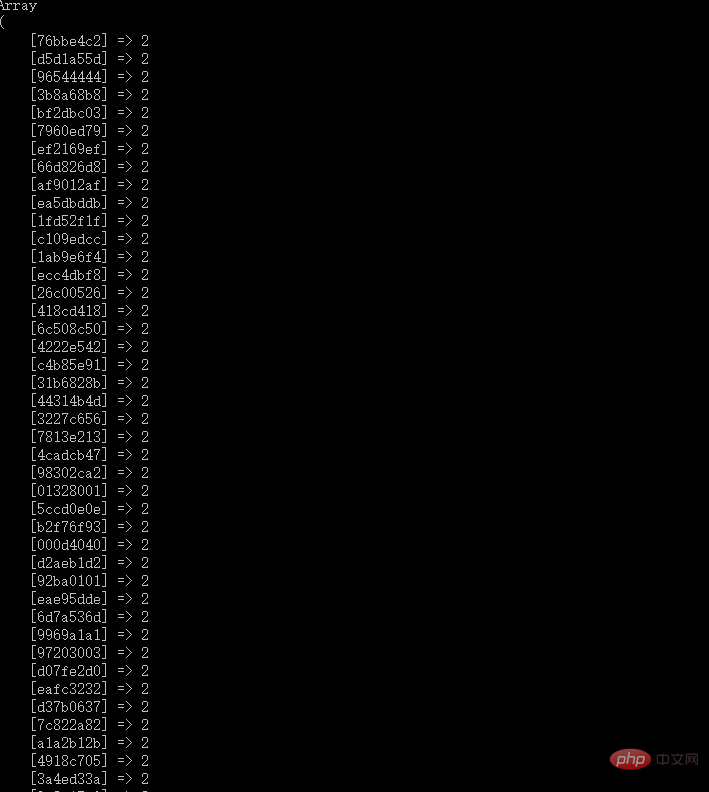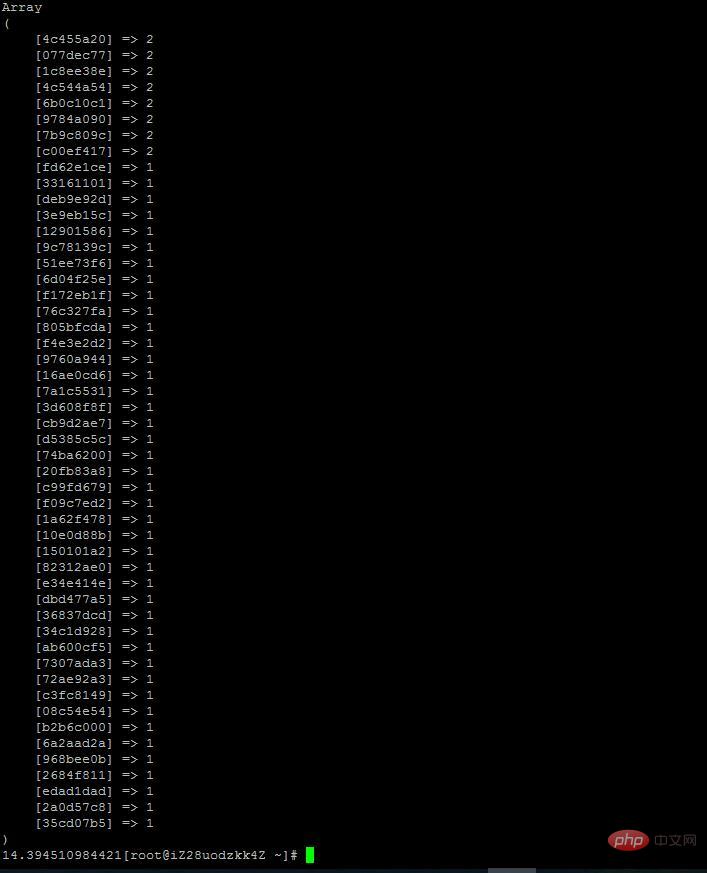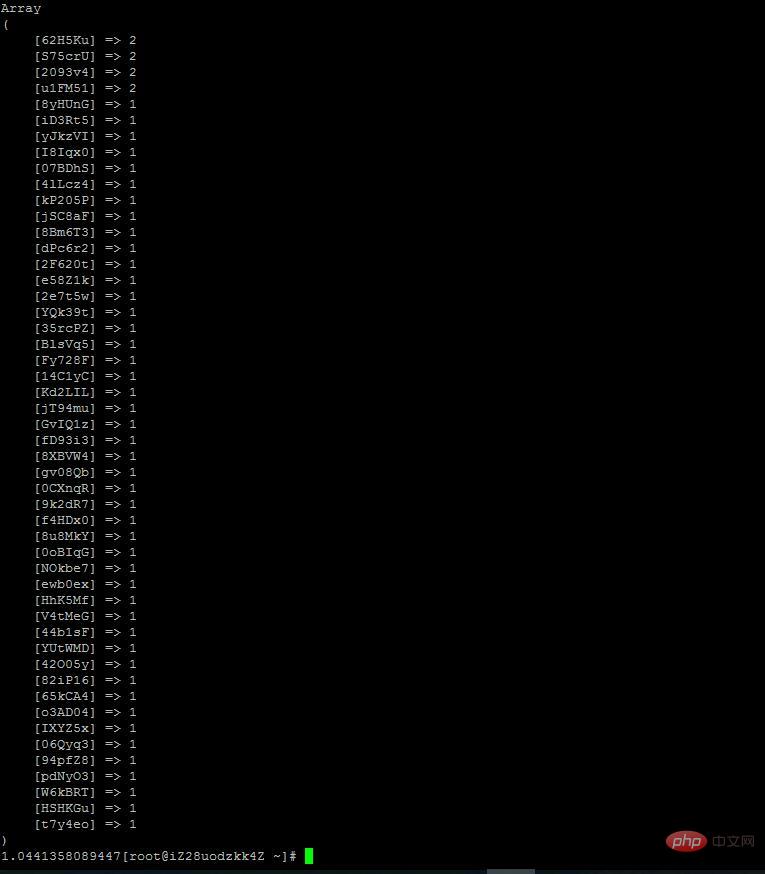
this article will introduce you to php random numbers and c extended random numbers. it has certain reference value. friends in need can refer to it. i hope it will be helpful to everyone.

because a fixed-length random string is used.
the first is a piece of php code
$str_md5=md5(uniqid()); $rand = mt_rand(1, 28); $str1=substr($str_md5,$rand,6); $rand = mt_rand(1, 28); $str2=substr($str_md5,$rand,6); $rand = mt_rand(1, 28); $str3=substr($str_md5,$rand,6); $code=substr($str1.$str2.$str3,0,8);

generate 180,000 random strings. the picture is arranged in reverse order according to the number of repetitions. you can see basically there are repetitions. but it's also ideal.
because i wanted to improve my c language skills, i rewrote the randomly generated string in c.
the random number functions srand() and rand() are used;
however, after an hour or two of hard work, there is still a problem with the random numbers. during concurrent access, the time may be almost at the same time, so the seed time given by srand can be regarded as the same. this results in the random numbers generated being the same. the resulting random string is the same. loop out random strings, almost all the same.
later i thought of ukey. this extension can implement a unique id. then every access will generate a unique id. can this id be used as the seed time? the answer is yes.
the above picture is a generated random string, the length can be customized. it is also possible to output strings with only numbers. compared with the random string generated by php, the repetition rate is lower and the speed is faster.
PHP_FUNCTION(get_random__num_str) { int length=8; if (zend_parse_parameters(ZEND_NUM_ARGS() TSRMLS_CC, "l", &length) == FAILURE) { length=8; } length++; int flag, i; char* string; __uint64_t timestamp = realtime(); __uint64_t retval; int len; char buf[128]; if (timestamp == 0ULL) { RETURN_FALSE; } spin_lock(lock, pid); if (context->last_timestamp == timestamp) { context->sequence = (context->sequence + 1) & context->sequence_mask; if (context->sequence == 0) { timestamp = skip_next_millis(); } } else { context->sequence = 0; /* Back to zero */ } context->last_timestamp = timestamp; retval = ((timestamp - context->twepoch) << context->timestamp_left_shift) | (context->datacenter_id << context->datacenter_id_shift) | (worker_id << context->worker_id_shift) | context->sequence; spin_unlock(lock, pid); //printf('%ld',retval); srand((unsigned)retval); //srand((unsigned) time(NULL )); if ((string = (char*) emalloc(length)) == NULL ) { //myLog("Malloc failed!flag:14\n"); RETURN_NULL() ; } for (i = 0; i < length - 1; i++) { flag = rand() % 3; switch (flag) { case 0: string[i] = '1' + rand() % 5; break; case 1: string[i] = '2' + rand() % 7; break; case 2: string[i] = '0' + rand() % 10; break; default: string[i] = '9'; break; } } string[length - 1] = '\0'; RETURN_STRINGL(string,length,0); } PHP_FUNCTION(get_random_str) { int length=8; if (zend_parse_parameters(ZEND_NUM_ARGS() TSRMLS_CC, "l", &length) == FAILURE) { length=8; } length++; int flag, i; char* string; __uint64_t timestamp = realtime(); __uint64_t retval; int len; char buf[128]; if (timestamp == 0ULL) { RETURN_FALSE; } spin_lock(lock, pid); if (context->last_timestamp == timestamp) { context->sequence = (context->sequence + 1) & context->sequence_mask; if (context->sequence == 0) { timestamp = skip_next_millis(); } } else { context->sequence = 0; /* Back to zero */ } context->last_timestamp = timestamp; retval = ((timestamp - context->twepoch) << context->timestamp_left_shift) | (context->datacenter_id << context->datacenter_id_shift) | (worker_id << context->worker_id_shift) | context->sequence; spin_unlock(lock, pid); //printf('%ld',retval); srand((unsigned)retval); //srand((unsigned) time(NULL )); if ((string = (char*) emalloc(length)) == NULL ) { //myLog("Malloc failed!flag:14\n"); RETURN_NULL() ; } for (i = 0; i < length - 1; i++) { flag = rand() % 3; switch (flag) { case 0: string[i] = 'A' + rand() % 26; break; case 1: string[i] = 'a' + rand() % 26; break; case 2: string[i] = '0' + rand() % 10; break; default: string[i] = 'x'; break; } } string[length - 1] = '\0'; RETURN_STRINGL(string,length,0); }

the above picture is the time it takes for php to generate 18w random string

the above picture is the c extension to generate 18w the time it takes to generate a random string
the servers used are alibaba cloud servers with 1g memory and dual cores.
as long as you add the above code to ukey, you can produce random strings and random length digital strings
ukey’s address http://www.oschina.net/p/ukey
recommended learning: "php video tutorial》




